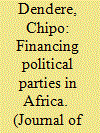| Srl | Item |
| 1 |
ID:
180258


|
|
|
|
|
| Summary/Abstract |
What is the impact of access to political party finance – money that parties use to fund their campaign activities – on politics in Africa? While multiparty elections have become more regular in the developing world, many opposition parties are still failing to win elections. This paper argues that poor access to political finance weakens democratic consolidation and negatively impacts the participation of less-resourced candidates who are unable to self-fund. As a result, opposition parties are forced to rely on weak promises of aid from international donors and unreliable state funding. This in-depth analysis of political finance, based on extensive interviews with politicians and government officials in Zimbabwe, political documents, news reports and a review of court cases, reveals that uneven financing has weakened opposition parties and serves as an extra advantage for incumbents.
|
|
|
|
|
|
|
|
|
|
|
|
|
|
|
|
| 2 |
ID:
166140


|
|
|
|
|
| Summary/Abstract |
There are differing views on the strengths and weaknesses of faith-based organizations relative to secular international nongovernmental organizations. This article argues that the theory of comparative advantage and the theory of organizational alignment are inadequate in helping to assess these strengths and weaknesses. The article offers a different perspective, called conduit engagement theory. It holds that humanitarian organizations naturally have specific relationships, organizational linkages, affiliations, or shared philosophies (referred to in the article as conduits) that enable certain programmatic interventions. Maximum effectiveness within the humanitarian marketplace is a function of the robustness of engagement of conduits with high-priority initiatives that have adequate funding over the necessary length of time. A new kind of tool for strategic planning within specific countries and for auditing at an organizational level are proposed.
|
|
|
|
|
|
|
|
|
|
|
|
|
|
|
|